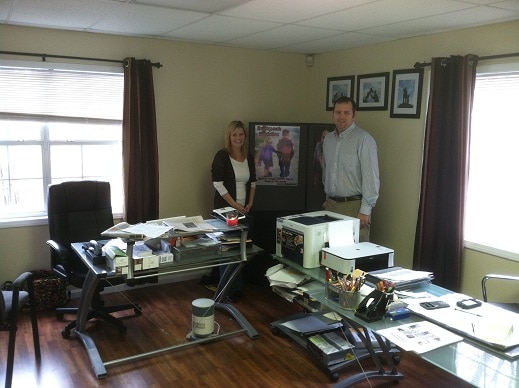Picture a young but maternal girl in a small bathroom putting concealer on her droopy little brother’s
chicken-pocked face. He’s worried about their ruse being discovered:
“Am I going to get in trouble?”
“No, you’re not gonna get in trouble.”
“I thought I can’t go to school if I’m sick.”
“Just go to school so you can get some lunch, then you can come home
afterwards.”
That’s the scene in a video from the “Backpack Buddies” section of Vineyard Family Service’s website. VFS is a
small nonprofit tucked in the back of a church in Shelby County, and the video highlights a
dilemma with implications for tens of millions of American kids, not to mention for their classmates and
for taxpayers. But when school’s closed, they don’t even have the choice of toughing it out and
spreading their germs, just so they can eat. Then what?
Karen Kapp, director of Better Basics, a children’s literacy and enrichment program
headquartered in Homewood, puts it matter-of-factly:
“A lot of them do go hungry.”
Then she points out another troubling reality: as kids’ brains
mature, the ones who don’t get enough food often fall further and further behind. Teachers
sometimes dig into their wallets to buy students food, partly because they know hunger increases the
chances of academic failure, which in turn increases the chances of health problems, unemployment,
and even crime.
States, school districts, and communities do have programs to get food to needy kids during school
breaks, but funding and staff are usually stretched thin. Summer programs especially rely on centralized
feeding sites, leaving carless rural kids with grumbling bellies. There are psychological obstacles, too.
As VFS founder Ward Williams puts it, lately “there’ve been a lot of people who had never gotten help from any kind of agency
before. They’re too proud to ever ask for help, so the kids were struggling.”
VFS’s Backpack Buddies program is a partial
solution to weekend hunger, and it sidesteps that stigma. As program director Stephanie Grissom
packs up donated, nonperishable, kid-accessible food (with extra little treats for the holidays), she says,”We make sure we have two lunches, and we have two breakfasts. And
then it all goes in a bag. And the bag is the way that it is because we want it to be discreet. It’s not
labeled, and they can’t see through it.”
Usually they hold volunteer assembly-line-style “packing parties.” Grissom and Williams drive the bags to sixteen elementary and middle schools, some of them an hour away. They unload them for school
counselors like Valley Elementary’s Kay McCrae, who sneaks them into needy kids’ backpacks to take
home on Fridays.
“They’ll wink at me in the hall or give me a thumbs up,” says McCrae. “And sometimes they even come up and
give me a hug and whisper in my ear, ‘Are you bringin’ my bag today?’ It almost brings tears to my
eyes.”
Williams says the program strengthens the counselor-student relationship:
“Johnny, Susie now trust Ms. Beard, so they come and say, ‘Ms. Beard, we’re also struggling
— we don’t have any power’ or ‘we had to cook our food last night on the barbecue pit.’ They start
learning more about them, and they’re able to find different answers to other issues that they’re facing.”
He and Grissom say another benefit of the program is that it’s not politically divisive. Few people have a
beef with nonprofits tiding over hungry kids for the weekend. And, as Williams puts it, “If you’re suspicious of a faith group or social service groups … it’s hard to embezzle a can
of ravioli or a juice box.”
But overall, Grissom says, they’re realistic about the scope of the problem.
“We’re not feeding the world, we’re not feeding the whole community,” she acknowledges. “We know we can’t
‘cure poverty,’ but we’re stabilizing their shaky economic situation.”
And counselor McCrae says a main goal of the program is being achieved.
“Their grades are improving. It does impact their ability to learn and focus.”
Vineyard Family Service’s “Backpack Buddies — and other backpack programs around the country — are
examples of what people can do with limited but targeted resources. According to several counselors, backpack programs have improved struggling kids’ grades, health, and the level of stress in
their homes. And assuming those backpacks have something to do with that, it’s hard to argue with the
results.

